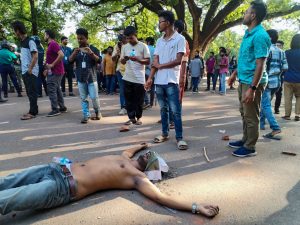A recent fact-finding report by the United Nations Office of the High Commissioner for Human Rights (OHCHR) on human rights violations in Bangladesh during the July-August student-led uprising laid bare former leader Sheikh Hasina’s direct and commanding role in serious human rights violations.
The OHCHR report explicitly attributes responsibility for gross human rights violations during the protests to the Hasina regime. According to the report, Hasina, who was then Bangladesh’s prime minister, and her Home Affairs Minister Asaduzzaman Khan Kamal personally coordinated brutal security operations. Despite warnings from senior officials regarding the excessive use of force, Hasina refused to change course and instead issued direct orders authorizing violent crackdowns, the report says.
The report’s findings will further taint Hasina’s image and legitimacy internationally, making her return and that of the Awami League (AL), the party she leads, to Bangladeshi politics tougher.
According to the OHCHR report, between July 1 and August 15, 2024, Bangladesh witnessed an unprecedented crackdown on dissent, triggered by student-led protests against the reinstatement of a “controversial quota system” in public sector jobs. The report details how Hasina’s government, in coordination with security forces and pro-government vigilante groups, resorted to violent suppression of peaceful demonstrators.
More than 1,400 people were killed with a significant number of fatalities caused by live ammunition fired indiscriminately by security forces. Between 12-13 percent of those killed were children. In addition, more than 11,700 people were arrested and detained. Victims were subjected to torture, including beatings, electric shocks, and threats of execution, to extract confessions or intimidate dissenters.
The Bangladesh Police, Rapid Action Battalion, Border Guard Bangladesh, and the Army were directly involved in these killings. Intelligence agencies, such as the Directorate-General of Armed Forces Intelligence and National Security Intelligence, collaborated with police in carrying out enforced disappearances of student leaders, the report said.
The report also highlighted the extreme attempts by Hasina’s government to conceal information about human rights violations. Journalists covering the protests were killed, injured, and arbitrarily arrested, preventing independent reporting on the violent crackdown.
Additionally, the internet and social media were strategically shut down, cutting off protesters’ ability to organize and blocking the public from accessing real-time information about the unfolding crisis. Security forces also raided hospitals, arrested injured protesters, and intimidated medical staff, effectively obstructing life-saving medical care and ensuring that evidence of the atrocities remained suppressed.
The OHCHR report is of the view that the Hasina regime’s crackdown on the protesters may be tantamount to crimes against humanity. In the words of the human rights body, “These serious human rights violations also raise concerns from the perspective of international criminal law, so that additional criminal investigations are warranted to determine the extent to which they may also amount to crimes against humanity.”
On August 5, 2024, Hasina fled to India, where she remains to date. Several AL politicians too fled to India in the days and weeks after the fall of her government. Bangladesh’s interim government, led by Dr. Muhammad Yunus, has repeatedly called for her extradition to face trial for alleged crimes against humanity.
This report is significant for several reasons and has implications for India. First, the report highlights a well-conceived strategy by the Yunus government to probe human rights violations committed by Hasina’s administration. Yunus likely recognized that a domestic investigation into the Bangladeshi state’s response to the July-August uprising under Hasina’s leadership would not attract significant attention abroad. Therefore, inviting the United Nations to undertake the investigation was a strategic move to ensure greater scrutiny and international awareness about Hasina’s role.
Second, the U.N. report will now be used by Bangladesh’s International Crimes Tribunal (ICT), which is preparing two cases of crimes against humanity against Hasina and 45 others, including 11 former ministers. Chief Prosecutor Tajul Islam recently told a press briefing that “The U.N. findings have clearly stated that the July-August atrocities were part of pre-planned crimes and those took place on Sheikh Hasina’s order.” The ICT is also expected to use the OHCHR report as a defensive measure against any potential international criticism regarding its procedures.
Third, the report will further undermine Hasina’s credibility internationally. Though she is unrepentant for the crimes that were committed on her orders and has vowed to return to Bangladesh politics, it will not happen any time soon. Millions of Bangladeshi youth are fearful of Hasina as they grew up under her heavy-handed regime, which forcefully disappeared, extrajudicially murdered, or threw thousands into jail for voicing criticism. They will resist her return. The AL is divided on its role in the July-August uprising. AL critics of the crackdown will be opposed to her return.
Finally, the report is likely to pose challenges for India on the international stage, as it may become increasingly difficult for India to justify providing shelter to Hasina and members of the AL, many of who have been implicated in serious human rights violations in Bangladesh.
With this dynamic, it is also likely that the relationship between the AL and India will start to weaken. For India, there is little to gain by supporting AL and Hasina when they do not enjoy wider public support in Bangladesh anymore. Rather, there is much more for India to gain from building a relationship with the current government and other parties.

































